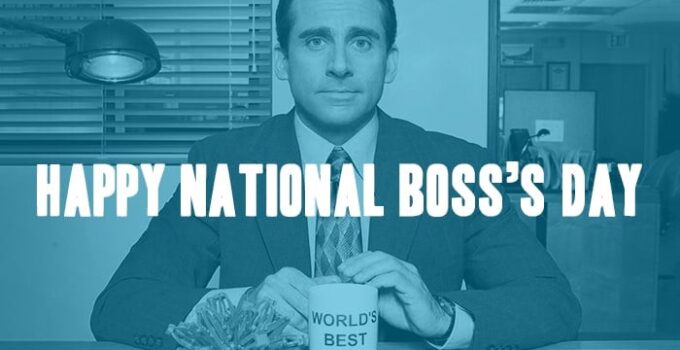Every October, someone in the office brings up Boss’s Day — and suddenly everyone scrambles to figure out if we’re actually supposed to do something for it. You’ll hear it called Boss’s Day, Bosses Day, or even Boss’ Day, but whatever version you use, it’s generally observed on October 16 in the United States.
Originally, the idea was simple — a day for employees to thank their bosses for being kind and fair throughout the year. But over time, it’s become a bit controversial. Some people call it a “Hallmark holiday,” something made up to sell cards rather than celebrate real appreciation. Others see it as unnecessary or even uncomfortable because of the power dynamicbetween employees and managers.
Still, I think there’s a balance to strike here. When done right, it can be a genuine moment to show appreciation for good leadership — not an obligation or a popularity contest.
A Brief History of Boss’s Day
The holiday actually started with one woman. In 1958, Patricia Bays Haroski, a secretary at State Farm Insurance in Deerfield, Illinois, registered “National Boss’ Day” with the U.S. Chamber of Commerce. She chose October 16 because it was her father’s birthday — and he happened to be her boss.
Her goal wasn’t to flatter him but to help younger employees understand how much effort goes into leadership and the challenges managers face. She wanted to build stronger relationships between bosses and their teams.
A few years later, in 1962, Illinois Governor Otto Kerner officially proclaimed it as an annual observance. Hallmark eventually caught on, releasing their first line of Boss’s Day cards in 1979. By 2007, they had increased their range by 28%, which tells you how quickly the holiday gained traction in offices across America.
Why Some People Don’t Like Boss’s Day
Not everyone’s a fan — and to be honest, I understand why. Critics say the whole thing flips traditional etiquette on its head.
Alison Green, a workplace expert from U.S. News, put it perfectly: workplace gift-giving should flow down, not up. In other words, it’s the boss who should recognize employees, not the other way around. After all, bosses already hold authority and influence — employees shouldn’t feel pressured to spend money or give gifts to someone who controls their livelihood.
The Society for Human Resource Management even recommends that in larger companies, HR should handle any appreciation for supervisors to keep things professional and fair. And honestly, I agree with that approach — it takes the pressure off employees and ensures the day doesn’t feel awkward.
How to Celebrate Without Making It Weird
If you actually want to celebrate Boss’s Day — and your workplace culture supports it — keep it light, simple, and genuine. The point isn’t to impress; it’s to acknowledge effort.
Here are a few thoughtful, low-pressure ideas that work well:
-
Bring in their favorite coffee or a bag of premium beans.
-
Bake cookies or grab pastries for the whole team.
-
A “Thanks a Latte” mug and a coffee shop gift card.
If you’ve got a more personal connection, you can make it specific:
-
A book they’ve mentioned wanting to read.
-
A small desk plant if they like greenery.
-
A gift card to their favorite restaurant.
Or skip the individual gifts altogether and make it a team effort. You can all sign a group card, pitch in for a single shared gift, or plan a lunch or potluck. That way, no one feels singled out or pressured.
One fun idea I’ve seen? A playful “Boss Awards” ceremony — nothing serious, just for laughs. Categories like:
-
Funniest Boss
-
Best-Dressed Boss
-
Boss Most Likely to Be in a Meeting
-
Most Caffeinated Boss
Just keep it light and positive. Avoid anything that touches on appearance or personal traits. The goal is to celebrate, not embarrass.
If You’re the Boss on Boss’s Day
If you’re a manager or business owner, my advice is simple — don’t expect anything. That’s not what the day is for. If your team gives you a card or small gesture, accept it graciously, but never hint at it or make anyone feel like it’s required.
Instead, use it as a chance to flip the script. Show appreciation for your own team. Bring in coffee, treat them to lunch, or send a quick thank-you message for everything they do. I’ve found that when bosses take the lead in appreciation, it sets the tone for a much healthier culture overall.
Let HR Handle It (If You’d Rather Not)
If you work in a larger company, it might make more sense to let HR coordinate any Boss’s Day activities. They can handle communication, set boundaries, and even organize a shared celebration that doesn’t single anyone out. That way, the day feels fair and professional rather than forced or awkward.
My Take on Boss’s Day
Personally, I see both sides. On one hand, it’s nice to have a reminder that good leadership deserves recognition. On the other, I completely understand the criticism — especially in workplaces where employees already feel stretched or undervalued.
For me, Boss’s Day works best when it’s authentic and mutual. It’s not about gifts or cards — it’s about taking a moment to acknowledge effort, whether that’s from your boss, your team, or both.
If you want to celebrate, do it because you mean it — not because you feel like you have to. That’s the real spirit of appreciation.

Jordan Ellis is a business writer and digital strategist at Hustle Framework, focused on practical tools and actionable insights for entrepreneurs. Passionate about helping you make smarter business decisions.




